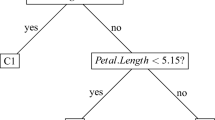Abstract
In the framework of binary segmentation, we propose a two-stage splitting algorithm which optimizes a defined predictability function. The idea is to find a binary tree whose nodes are internally most homogeneous and externally most heterogeneous with respect to the predictability of their cases. The main steps of the algorithm will be described. Some relations with the CART splitting procedure will be discussed and an example will be shown.
Access this chapter
Tax calculation will be finalised at checkout
Purchases are for personal use only
Preview
Unable to display preview. Download preview PDF.
Similar content being viewed by others
References
Akaike, H. (1974). A new look at the statistical model identification. IEEE Transactions on Automatic Control, AC-19-6, 716–723.
Breiman, L., Friedman, J.H., Olshen, R.A. and Stone, C.J. (1984). Classification and Regression Trees. Wadsworth International Group, Belmont, California.
Ciampi, A., Thiffault, J. and Sagman, U. (1988). Evaluation de classifications par le critere d’Akaike et la validation croisee. Revue Statistique Appliquees, XXXVI, 3, 51–68.
Diday, E. et al. (1980). Optimisation en classification automatique. INRIA, Le Chesnay.
Fisher, W.D. (1958). On grouping for maximal homogeneity. Journal of the American Statistical Association, 53, 789–798.
Goodman, L.A. and Kruskal, W.H. (1954). Measures of association for crossclassification. Journal of the American and Statistical Association, 48, 732–762.
Gueguen, A. and Nakache, J.P. (1988). Methode de discrimination basee sur la construction d’un arbre de decision binaire. Revue Statistique Appliquee, XXXVI, 1, 19–38.
Lauro, N.C., Celeux, G. and Lechevallier, Y. (1982). Contributi dell’analisi multidimensionale nello studio di gruppi clinici a priori mal definiti. Rivista di Statistica Applicata, 93-117.
Meunier, P., Diday, E. and Rasson, J.P. (1986). Une methode de selection typologique de variables. Data Analysis and Informatics, IV, 319–329.
Mola, F. and Siciliano, R. (1991). A two-stage splitting criterion in binary segmentation. Technical Report 01–91 of Dipartimento di Matematica e Statistica, Università di Napoli.
Morgan, J.N. and Sonquist, J.A. (1963). Problems in the analysis of survey data and proposals. Journal of the American and Statistical Association, 58, 415–434.
Rao, M.R. (1971). Cluster analysis and mathematical programming. Journal of the American and Statistical Association, 66, 622–626.
Author information
Authors and Affiliations
Editor information
Editors and Affiliations
Rights and permissions
Copyright information
© 1992 Springer-Verlag Berlin Heidelberg
About this paper
Cite this paper
Mola, F., Siciliano, R. (1992). A Two-Stage Predictive Splitting Algorithm in Binary Segmentation. In: Dodge, Y., Whittaker, J. (eds) Computational Statistics. Physica, Heidelberg. https://doi.org/10.1007/978-3-662-26811-7_26
Download citation
DOI: https://doi.org/10.1007/978-3-662-26811-7_26
Publisher Name: Physica, Heidelberg
Print ISBN: 978-3-662-26813-1
Online ISBN: 978-3-662-26811-7
eBook Packages: Springer Book Archive




